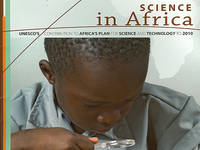West African Regional Capacity Building workshop in Science, Technology and Innovation Policy and Statistics
UNESCO Division for Science Policy and Capacity-Building,
UNESCO Institute for Statistics,
UNESCO Bamako Cluster Office,
African Union, NEPAD,
Ministry of Higher Education and Scientific Research, Mali
SCIENCE, TECHNOLOGY AND INNOVATION POLICY REVIEWS
I. Background
The Addis Ababa Declaration on Science and Technology and Scientific Research for Development adopted by Heads of State and Government of the African Union, Ethiopia, January 2007, called upon “UNESCO and other bilateral and multilateral organizations to support the Member States, Regional Economic Communities and the African Union to implement the Summit decision on Science and Technology”. As a response to the AU request, the Executive Board (177 EX/16) and the General Conference (194 member states) of UNESCO (November 2007) approved the UNESCO Plan of Action proposed by the Director General (UNESCO Resolution 21. The governing bodies of UNESCO adopted 3 flagship projects as part of the Plan of Action: i) capacity building in science, technology and innovation policy; ii) enhancing science and technology education and iii) the African Virtual Campus.
UNESCO has a long tradition in assisting Member States in science policy reviews, which dates back to the early 1960s. These efforts culminated in a series of Ministerial meetings in Africa, known as CASTs (Conference of Ministers Responsible for the Application of Science and Technology to Development in Africa), including CASTAFRICA. Strengthening capacity in science for sustainable development, and harnessing the fruits of scientific discoveries, can only be achieved within a comprehensive framework of science and technology policy. Subsequently, national authorities have become increasingly aware of the importance of elaborating national policies and strategies in the area of science and technology, as a prerequisite for effective development policies. As a result, many African Member States have sought, and are still seeking UNESCO’s support in formulating National science policies. The role of UNESCO in STI policy is threefold: a think tank on policy development; a guide for national policy reforms; and a catalyst for regional and international cooperation.
This meeting, hosted by the Ministry of Higher Education and Scientific Research of Mali, was intended to bring together representatives from West Africa in a capacity building initiative in STI policy reviews and promote regional cooperation.
II. Objectives
- African Union Consolidated Plan of Action (CPA) for S&T, objective: creation of institutional and policy frameworks to conduct and generate STI
- Assess the status of STI policy needs and training in the region;
- Strengthen capacity in STI policy reviews and formulation;
- Open a dialogue with regional and international STI policy experts; identify mutual cooperation/collaborations;
- Share experiences between countries having reviewed their STI policies (procedures, identification of priorities, implementation of projects);
- Improve the quality of STI policy and promote the adoption of national STI policies;
- Promote STI policies and strategies and assist Member States to elaborate and implement programmes that contribute to effective STI policy.
SCIENCE, TECHNOLOGY AND INNOVATION INDICATORS:
CURRENT ISSUES AND CHALLENGES IN WEST AFRICA
III. Background
The UNESCO Institute for Statistics (UIS), in collaboration with the UNESCO Division for Science Policy and Capacity-Building, Natural Sciences Sector, Paris (SC/PCB), have designed and implemented a worldwide capacity building programme on science and technology statistics and indicators.
This regional meeting has brought together simultaneously S&T statisticians and policymakers. Important issues for these countries analyzed, especially the need to link S&T data to S&T policy and economic growth.
IV. Objectives
African Union Consolidated Plan of Action (CPA) for S&T, objective: African science, technology and innovation indicators initiative to monitor Africa’s S&T development
- Analyze recent national experiences and trends regarding science, technology and innovation policy-relevant indicators in West African countries;
- Training of high-level technical staff from S&T statistical bodies in West African countries;
- Increase the number of countries regularly producing quality S&T indicators, in line with the requirements of the CPA;
- Strengthen local capacities as indicated in the CPA, for the production of such indicators, with the final aim of establishing sustainable local S&T statistics systems in West African countries;
- Promote the use of S&T indicators to support evidence-based S&T policy making;
- Share experiences with other countries in the region regarding S&T indicators, and to address the problems that countries may have encountered in collecting and analyzing S&T statistics.
V. Organizing Institutions
- UNESCO Division for Science Policy and Capacity-Building (SC/PCB);
- UNESCO Institute for Statistics (UIS);
- UNESCO Bamako Cluster Office;
- Ministry for Higher Education and Scientific Research of Mali;
- AU/NEPAD Planning and Coordination Agency.
VI. Participants
- 75 high-level technical staff and decision-makers from S&T policy and S&T statistics organizations from West African countries;
- West African Economic and Monetary Union (UEMOA)Secretariat;
- Economic Community of West African States (ECOWAS) Secretariat;
- 5 high-level lecturers (UNESCO, UIS, international experts); and,
- AU/NEPAD Planning and Coordination Agency
- AECID
VII. Organization Committee
- Pr Juma Shabani, Director UNESCO Bamako Cluster Office;
- Dr Shamila Nair-Bedouelle, Head of the Consolidated Plan of Action (AU/CPA) Implementation Unit, SC/PCB Division, UNESCO, Paris;
- Mr Martin Schaaper, Programme Specialist S&T Statistics, UIS, Montreal;
- Ms Mundele Wavelellah,UNESCO Bamako Cluster Office;
- Ms Juliana Chaves-Chaparro, Associate Expert, UNESCO, SC/PCB/ CPA ;
- Ministry of Higher Education and Scientific Research, Mali; and
- AU/NEPAD Planning and Coordination Agency.
VIII. Funding
The workshop is financed by the Spanish Development Funds, UNESCO, UIS and to the Government of the Republic of Mali
- Read the Preliminary programme.
- Read more about the sub-regional workshops UNESCO is organizing in Africa between 2008-2013 to build capacity in STI policy reviews.
- The workshop was one of a series of UNESCO workshops designed to build capacity in STI policy reviews in Africa.
For details, contact the focal point at UNESCO.


